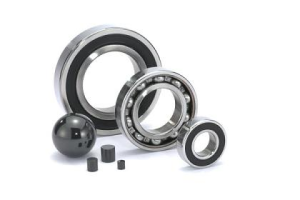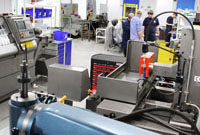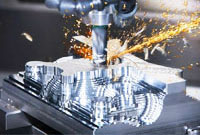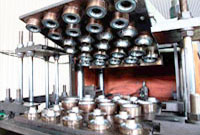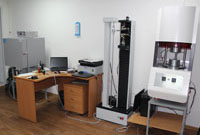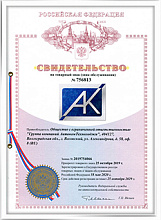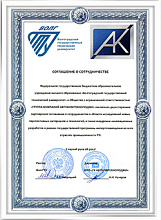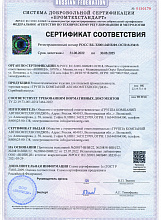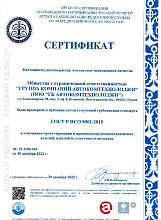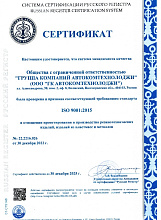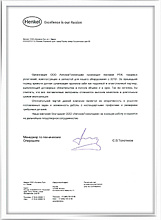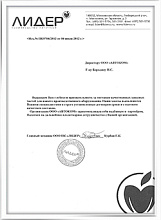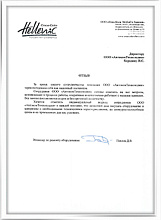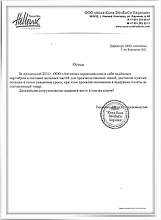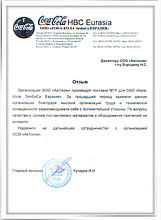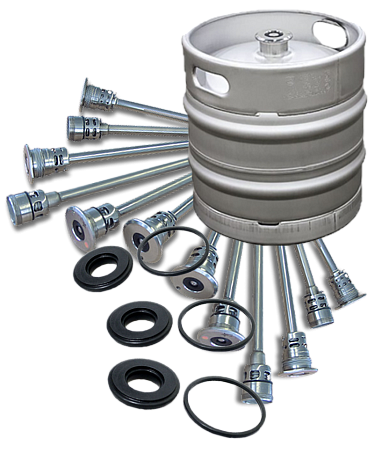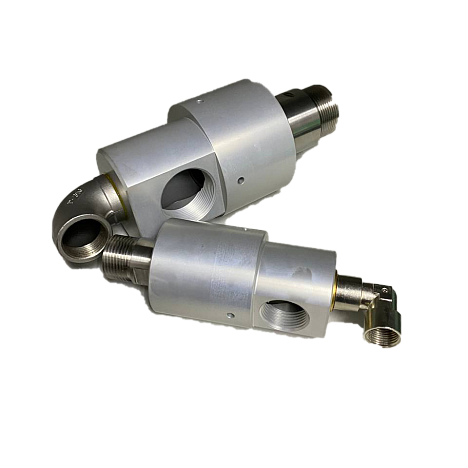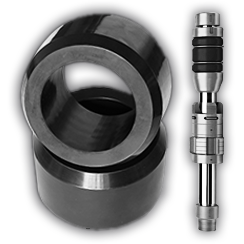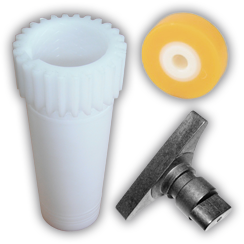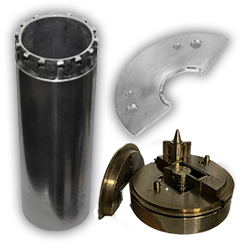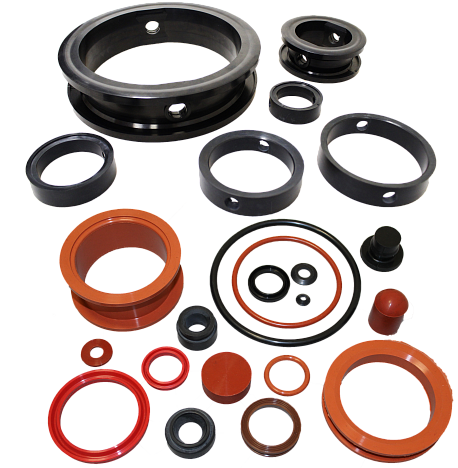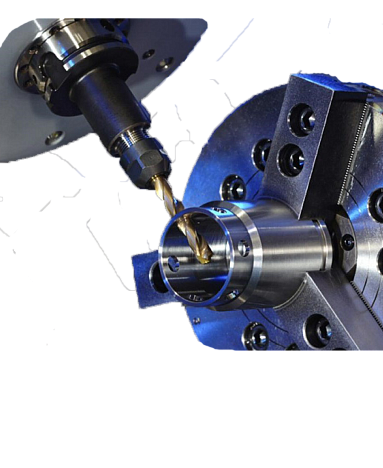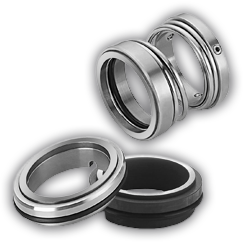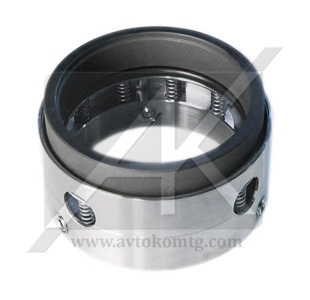NV-1 Mechanical seal with set of small springs
DIN 24960
Disadvantages of the central spring design: uneven load distribution along the friction belt in the couple due to the non-perpendicularity of the spring ends in relation to its axis, resulting in the couple being subject to unilateral wear, a comparatively large size of the spring in the axial direction and its inefficiency for large-sized shafts.
Mechanical seals with a set of small cylindrical springs have a smaller axial size than central spring seals and have no limitations as to the shaft diameter. By using a set of small springs, it is possible to increase unification of the Mechanical seal design: one and the same spring can be used for sealing different diameters. The sealing force can be adjusted by changing the number of springs and keeping constant the axial movement of the rigid element. The seal design ensures its low-cost maintenance due to easily replaceable parts. This kind of seal is often used in pumps at refineries, petrochemical plants and in the process industry. The secondary seal on the axis is completed by means of an O-ring or PTFE ring wedgewise.
The disadvantage of this kind of rigid elements is the small diameter (1 mm) of the spring wire, which makes its application in corrosive media limited.
The rigid element design based on a set of small springs is not recommended for use in media with solid inclusions.
The springs are quickly clogged with solid inclusions, which causes the rigid element to lose its axial movement ability.
The more compact version allows it to be used in pumps for heating, in sludge and fecal pumps, as well as in food industry pumps.
Analog:
AESSEAL M03 / M03S, Burgmann BT-C56.KU / BT-C5.KU / M74N, John Crane 59U / 58U, Vulcan 1659 / 1659S, Sterling 259 / 259S, Type 153 / 251 by OST
Materials for sealing faces:
carbographite
chromium steel
nickel chrome steel
increased rigidity nickel chrome steel
tungsten carbide
silicon carbide
ceramics (AI2O3)
Operating limits:
p = 16 bars
t = -40 ... 220В°C
v = 20 m/s
NV-1.1 carbographite pressed into the sealing surface frame
NV-1.2 silicon carbide pressed into the sealing surface frame
NV-1.3 seal surface with tungsten carbide soldered on
|
d1 |
d3 |
D4 |
D6 |
D7 |
D8 |
l3 |
l4 |
l1k |
|
18 |
32 |
34 |
27 |
33 |
3 |
26 |
11.5 |
37.5 |
|
20 |
34 |
36 |
29 |
35 |
3 |
26 |
11.5 |
37.5 |
|
22 |
36 |
38 |
31 |
37 |
3 |
26 |
11.5 |
37.5 |
|
24 |
38 |
40 |
33 |
39 |
3 |
28.5 |
11.5 |
40 |
|
25 |
39 |
41 |
34 |
40 |
3 |
28.5 |
11.5 |
40 |
|
28 |
42 |
44 |
37 |
43 |
3 |
31 |
11.5 |
42.5 |
|
30 |
44 |
46 |
39 |
45 |
3 |
31 |
11.5 |
42.5 |
|
32 |
46 |
48 |
42 |
48 |
3 |
31 |
11.5 |
42.5 |
|
33 |
47 |
49 |
42 |
48 |
3 |
31 |
11.5 |
42.5 |
|
35 |
49 |
51 |
44 |
50 |
3 |
31 |
11.5 |
42.5 |
|
38 |
54 |
58 |
49 |
56 |
4 |
31 |
14 |
45 |
|
40 |
56 |
60 |
51 |
58 |
4 |
31 |
14 |
45 |
|
43 |
59 |
63 |
54 |
61 |
4 |
31 |
14 |
45 |
|
45 |
61 |
65 |
56 |
63 |
4 |
31 |
14 |
45 |
|
48 |
64 |
68 |
59 |
66 |
4 |
31 |
14 |
45 |
|
50 |
66 |
70 |
62 |
70 |
4 |
32.5 |
15 |
47.5 |
|
53 |
69 |
73 |
65 |
73 |
4 |
32.5 |
15 |
47.5 |
|
55 |
71 |
75 |
67 |
75 |
4 |
32.5 |
15 |
47.5 |
|
58 |
78 |
83 |
70 |
78 |
4 |
37.5 |
15 |
52.5 |
|
60 |
80 |
85 |
72 |
80 |
4 |
37.5 |
15 |
52.5 |
|
63 |
83 |
88 |
75 |
83 |
4 |
37.5 |
15 |
52.5 |
|
65 |
85 |
90 |
77 |
85 |
4 |
37.5 |
15 |
52.5 |
|
68 |
88 |
93 |
81 |
90 |
4 |
37.5 |
15 |
52.5 |
|
70 |
90 |
95 |
83 |
92 |
4 |
43 |
17 |
60 |
|
75 |
99 |
104 |
88 |
97 |
4 |
43 |
17 |
60 |
|
80 |
104 |
109 |
95 |
105 |
4 |
43 |
17 |
60 |
|
85 |
109 |
114 |
100 |
110 |
4 |
43 |
17 |
60 |
|
90 |
114 |
119 |
105 |
115 |
4 |
48 |
17 |
65 |
|
95 |
119 |
124 |
110 |
120 |
4 |
48 |
17 |
65 |
|
100 |
124 |
129 |
115 |
125 |
4 |
48 |
17 |
65 |
+ customized seals as per your drawings and specifications
- Description
DIN 24960
Disadvantages of the central spring design: uneven load distribution along the friction belt in the couple due to the non-perpendicularity of the spring ends in relation to its axis, resulting in the couple being subject to unilateral wear, a comparatively large size of the spring in the axial direction and its inefficiency for large-sized shafts.
Mechanical seals with a set of small cylindrical springs have a smaller axial size than central spring seals and have no limitations as to the shaft diameter. By using a set of small springs, it is possible to increase unification of the Mechanical seal design: one and the same spring can be used for sealing different diameters. The sealing force can be adjusted by changing the number of springs and keeping constant the axial movement of the rigid element. The seal design ensures its low-cost maintenance due to easily replaceable parts. This kind of seal is often used in pumps at refineries, petrochemical plants and in the process industry. The secondary seal on the axis is completed by means of an O-ring or PTFE ring wedgewise.
The disadvantage of this kind of rigid elements is the small diameter (1 mm) of the spring wire, which makes its application in corrosive media limited.
The rigid element design based on a set of small springs is not recommended for use in media with solid inclusions.
The springs are quickly clogged with solid inclusions, which causes the rigid element to lose its axial movement ability.The more compact version allows it to be used in pumps for heating, in sludge and fecal pumps, as well as in food industry pumps.
Analog:
AESSEAL M03 / M03S, Burgmann BT-C56.KU / BT-C5.KU / M74N, John Crane 59U / 58U, Vulcan 1659 / 1659S, Sterling 259 / 259S, Type 153 / 251 by OST
Materials for sealing faces:
carbographite
chromium steel
nickel chrome steel
increased rigidity nickel chrome steel
tungsten carbide
silicon carbide
ceramics (AI2O3)
Operating limits:
p = 16 bars
t = -40 ... 220В°C
v = 20 m/s
NV-1.1 carbographite pressed into the sealing surface frame
NV-1.2 silicon carbide pressed into the sealing surface frame
NV-1.3 seal surface with tungsten carbide soldered on
d1
d3
D4
D6
D7
D8
l3
l4
l1k
18
32
34
27
33
3
26
11.5
37.5
20
34
36
29
35
3
26
11.5
37.5
22
36
38
31
37
3
26
11.5
37.5
24
38
40
33
39
3
28.5
11.5
40
25
39
41
34
40
3
28.5
11.5
40
28
42
44
37
43
3
31
11.5
42.5
30
44
46
39
45
3
31
11.5
42.5
32
46
48
42
48
3
31
11.5
42.5
33
47
49
42
48
3
31
11.5
42.5
35
49
51
44
50
3
31
11.5
42.5
38
54
58
49
56
4
31
14
45
40
56
60
51
58
4
31
14
45
43
59
63
54
61
4
31
14
45
45
61
65
56
63
4
31
14
45
48
64
68
59
66
4
31
14
45
50
66
70
62
70
4
32.5
15
47.5
53
69
73
65
73
4
32.5
15
47.5
55
71
75
67
75
4
32.5
15
47.5
58
78
83
70
78
4
37.5
15
52.5
60
80
85
72
80
4
37.5
15
52.5
63
83
88
75
83
4
37.5
15
52.5
65
85
90
77
85
4
37.5
15
52.5
68
88
93
81
90
4
37.5
15
52.5
70
90
95
83
92
4
43
17
60
75
99
104
88
97
4
43
17
60
80
104
109
95
105
4
43
17
60
85
109
114
100
110
4
43
17
60
90
114
119
105
115
4
48
17
65
95
119
124
110
120
4
48
17
65
100
124
129
115
125
4
48
17
65
+ customized seals as per your drawings and specifications
- Name
- NV-1 Mechanical seal with set of small springs
 en
en
 Русский [ru]
Русский [ru]

